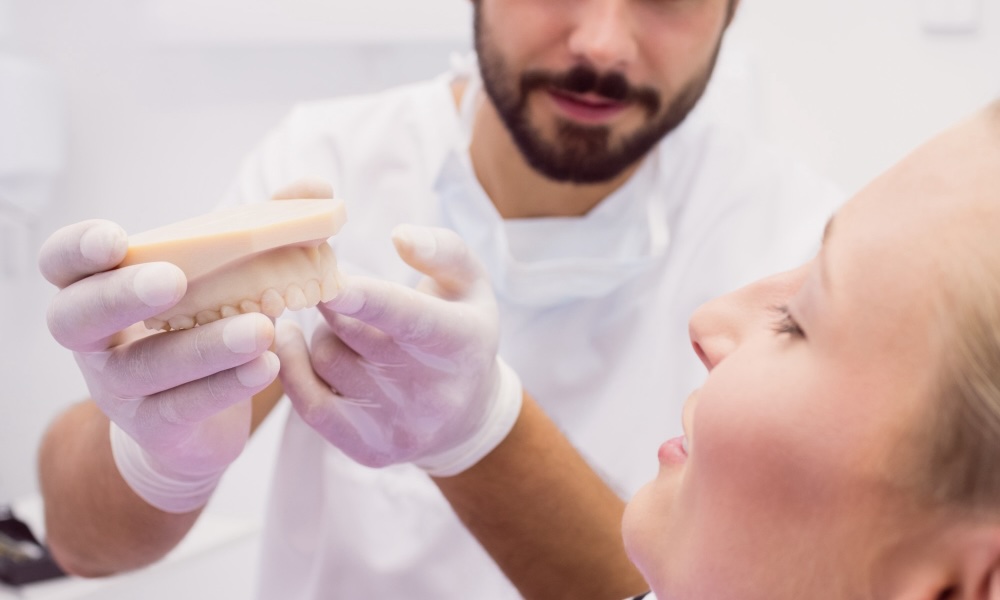If you have a tooth with severe decay or damage, your dentist may recommend a dental crown. This treatment can help save and protect the remaining healthy tooth structure and provide additional support to it so it can function as normally as possible.
A dental crown is a tooth cap that is placed over a weakened tooth. It is custom-made in size, shape, and colour to match the rest of your natural teeth. It also comes in different materials depending on your specific needs.
In this comprehensive read, we will understand more about dental crowns, how they can help with your smile and oral health, and the procedure involved; you can also explore our dental crowns guide for Vancouver patients.

The Benefits of Dental Crowns
Dental crowns offer a variety of benefits to the smile, oral health, and overall well-being, making them a great choice for restoring teeth. Here's why you might consider getting a crown (and if you're unsure, learn how to know if you need a crown):
Protects and reinforces damaged teeth
A weakened tooth, whether due to decay or trauma, can easily break down if left untreated. To preserve the tooth and enhance its strength, a tooth cap may be placed over it. This can also help with a tooth that has undergone root canal therapy as it can be brittle and prone to breakage.
Improves appearance and aesthetics
A decayed, misshapen, or discoloured front tooth negatively impacts the smile. This can be repaired with a dental crown that is bespoke to the colour of the adjacent teeth. Full dental crowns are also ideal for smile makeovers as it can cover up cosmetic imperfections to create a perfect smile.
Enhances chewing and speaking ability
Broken down back teeth (molars) can make chewing difficult. But after restoration with a crown, you can confidently chew and bite your favourite foods without worries of it breaking or chipping.
Prevents movement of other teeth
Crowns can prevent damage to the tooth that may eventually lead to tooth loss. With that, it can keep the surrounding teeth in place, avoiding alignment issues and bite problems. They can also be used to anchor a dental bridge when replacing a missing tooth.
Long-term smile investment
Despite daily wear and tear, the longevity of a dental crown is highly reliable. This is especially with zirconium material, which can withstand heavy chewing and biting.
The Dental Crown Procedure
If you are looking to get dental crowns, here is a general overview of what to expect during the procedure:
- Initial Consultation and Examination
The first step is to assess the affected tooth and take your X-rays. This will allow your dentist to evaluate the remaining tooth structure, measure the tooth root, and assess the surrounding bone to ensure that everything is in the ideal condition for a tooth crown.
- Preparation of the Tooth
Then, local anaesthesia is placed to numb the area and allow your dentist to shape the tooth without any discomfort on your end. If there is too much damage, a build-up is necessary to reinforce what structure is left, making it more sturdy for the future dental crown. Then, a tooth impression and mould is obtained and sent to the dental lab for your crown fabrication.
- Placement of Temporary Crown
As you wait for your crown to be completed, a temporary crown is placed over the prepared tooth. This will protect the tooth from sensitivity and breakage.
- Fitting and Placement of Permanent Crown
After a few days, your permanent crown should be ready for a trial fit. Adjustments are made accordingly so the crown matches your smile and bite. If it is to you and your dentist's liking, it will be permanently cemented in place to complete your new look.

Recovery and Aftercare
Proper care and maintenance of your crown is important so it can remain beautiful and functional for a very long time. Here are a few tips to help it last:
Immediate post-procedure care
- Avoid sticky or hard foods – For the first 24 hours, the cement of your crown will continue to harden. During this time, avoid consuming anything too hard, sticky, or crunchy as this will place a strain on the newly placed crown.
- Use a sensitivity toothpaste – Some tooth sensitivity can be expected, especially when drinking something cold. Manage this by using a toothpaste specifically for sensitive teeth.
Long-term maintenance
- Practice good oral hygiene – Brushing and flossing are essential to prevent plaque build-up that may cause decay of the tooth under the crown.
- Visit your dentist regularly – It is recommended to visit your dentist twice a year for check-ups and professional teeth cleaning. Routine visits can help your dentist catch and treat any problems before they damage your crown.
- Use a nightguard – If you are prone to teeth grinding, consider using a nightguard to protect the teeth and the crown.
Potential Issues with Dental Crowns and How to Handle Them
While dental crowns are a very reliable option for restoring teeth, some issues can arise along the way. Knowing what these issues are can help you understand how to manage them should it happen to you.
- Loose crown – If your crown becomes loose, immediately contact your dentist so they can assess if a recementation or replacement is due. Do not delay this as the crown may fall off.
- Sensitivity – While tooth sensitivity is normal for a few days after getting your crown, there might be a problem if it persists for weeks. This may indicate an ill-fitted crown or remaining tooth decay to the tooth under it. Have your dentist check so they can identify the cause and provide timely treatment.
- Chipping or cracking – Biting on something too hard or trauma can cause a crown to chip. Sometimes, a quick restoration on the material is possible, especially if the chip is minimal. But, larger damage may require a replacement.
The Cost of Dental Crowns in Vancouver
The cost of dental crowns in Vancouver starts at $1,431. A thorough evaluation of your case is important as this will determine the preparatory procedures that need to be done, amount of healthy tooth structure left, and the best material to be used for the crown.
Affordable dental crowns are usually made with metal-porcelain material. This has a metal inner layer and a porcelain outer layer. The combination of these two materials contributes both to the strength and the natural appeal of the crown. But, over the years, the metal colour of the crown may eventually stain the gum, making it look less aesthetically pleasing.
If you are looking for the most natural-looking material, you may opt for an all-porcelain crown. This mimics the translucency of your natural tooth so it will blend nicely when you smile.
Ultimately, it is best to discuss with your dentist so that you can understand your options and the corresponding cost that your treatment will entail.
Contact Arbutus Station Dental Today
If you have a weakened tooth that needs protection, a cover-up for certain smile imperfections, or a beautiful smile upgrade, dental crowns may be the right choice for you. At Arbutus Station Dental, our experienced team is here to guide you through the process and help you pick the best type of crown for you.
Call us at (604) 738-4223 to book a consultation today!
